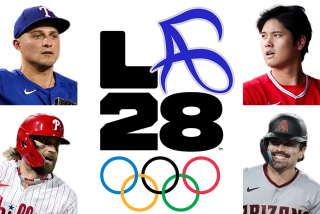Players Must Act Like a Labor Union
- Share via
Millions of baseball fans have put aside their bitterness toward the national pastime, submerged their memories of last year’s strike-shortened season and headed to the ballpark. Meanwhile, representatives of the Major League Players Assn. and the major-league owners try to negotiate the agreement that eluded them last year and led to the 234-day strike.
But what if there is no settlement? Another strike could irreparably shatter fans’ loyalty to the game and its players.
Two developments have to occur if baseball wants to restore the public’s fragile support. First, the owners have to give up on their dreams of major take-backs from the players and a salary cap. Second, the players’ union has to transform itself from a narrowly focused craft guild and reach out to America’s working people through gestures of solidarity. In short, it has to behave more like a union.
A representative of the players’ union recently said that “playing good baseball will generate all the good will we need.” If this is the union’s official position, the players are living in a dream world. It is the same world that Lane Kirkland inhabited before a younger generation of labor leaders ousted him as president of the AFL-CIO. John J. Sweeney, the new AFL-CIO chief, has wisely advised the union movement to “change its organizational culture.” The players’ union should heed this advice.
In so doing, the players could help rebuild the American labor movement as an instrument for middle-class advancement. This doesn’t mean that batting-champion Tony Gwynn or Cy Young-winner Greg Maddux must quote Samuel Gompers or sing “Solidarity Forever” in the clubhouse. But the players, most of whom come from working-class backgrounds, should recognize that they owe their spectacular salary and benefits not only to their talent, hard work and union, but also to the fans who buy the tickets and watch them on television.
Baseball’s fans are increasingly squeezed by declining wages, corporate downsizing and widening inequality. When middle-class Americans struggle to make ends meet, buy a house or send their kids to college, they are hard put to relate to muscular millionaires carping about salary caps.
If this trend continues, even the most die-hard baseball fan will discover that a night at the ballpark is financially out of reach. The players’ union must recognize that their fate is intertwined with that of America’s working families.
When the players’ union began in the early 1970s, “we didn’t just explain the labor laws; we had to get players to understand that they were a union,” recalls Marvin Miller, its first executive director. “We did a lot of internal education to talk to players about broader issues.” Today’s union leaders should restore Miller’s education program to remind players that they do not toil in economic isolation.
Here are some steps that players could take to identify with the working families who support them by going to the ballpark.
* Major leaguers could lend their celebrity status to workers struggling to maintain or improve their working and living conditions, just as highly paid performers like Paul Newman, Harry Belafonte and Charlton Heston boosted the civil rights movement by joining the March on Washington in 1963.
For example, Dodgers Eric Karros and Ramon Martinez could appear in commercials urging a “yes” vote on the statewide referendum to increase the California minimum wage. Or Ken Griffey Jr. could have walked the picket line with members of the International Assn. of Machinists during their Boeing strike.
* Echoing concerns about corporate responsibility and runaway jobs, the players should demand that team owners buy their uniforms, bats, helmets and balls from companies that pay workers decent wages and benefits. For example, they could focus attention on the employees of Russell Mills in Alexander City, Ala., which manufactures most major league uniforms. It is “one of the most anti-union companies around,” says Billy Tindle, secretary-treasurer of the Alabama AFL-CIO.
* At the least, the union should raise the issue of why a low-wage country like Costa Rica supplies the major leagues with a million baseballs a year. Players could insist that the production of all baseball equipment be done in the United States.
* The players’ union should be the institutional conscience of the game. During the strike, it should have set aside a small part of its large strike fund to help stadium employees who were temporarily out of work during the strike.
* The union should continue to demand that the owners “open the books” so the players (as well as the fans) can scrutinize the teams’ financial conditions to show how profits may be hidden by bookkeeping tricks. Such was the brilliant strategy that United Auto Worker President Walter P. Reuther used during the famous 134-day “open the books” strike against General Motors in 1945-1946. Reuther insisted that GM could grant a wage increase without having to pass it to consumers. Similarly, the players’ union could show that the owners’ lack a clear justification to raise ticket prices.
The Major League Players Assn. can resurrect itself, but only if it becomes an organization that speaks to and for a broader community--for the people who put the uniforms on their backs and balls on the field, and for the men, women and kids who still have to pay the price of a ticket.*
More to Read
Go beyond the scoreboard
Get the latest on L.A.'s teams in the daily Sports Report newsletter.
You may occasionally receive promotional content from the Los Angeles Times.










